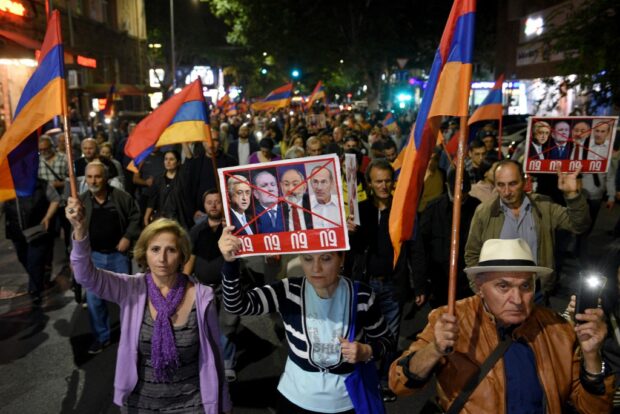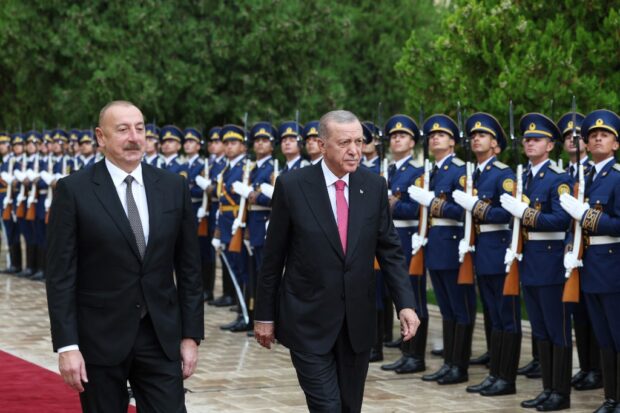Thousands flee into Armenia after Azerbaijan retakes enclave

People take part in an anti-government rally in downtown Yerevan on September 25, 2023, following Azerbaijani military operations against Armenian separatist forces in Nagorno-Karabakh. (Photo by KAREN MINASYAN / AFP)
Goris, Armenia — Thousands of refugees from Nagorno-Karabakh streamed into Armenia Monday as a deadly blast rocked a fuel depot in the rebel enclave and Azerbaijan and ally Turkey hailed Baku’s victory over the majority ethnic Armenian area.
While Azerbaijan showcased its regional alliances, Russia hit back at embattled Armenian Prime Minister Nikol Pashinyan after he blamed Moscow for the swift defeat of the breakaway territory.
Several days after the fighting, the first refugees arrived in Armenia on Sunday and 6,650 people have so far entered, Yerevan said on Monday.
AFP reporters saw the refugees crowding into a humanitarian hub set up in a local theatre in the city of Goris to register for transport and housing.
“We lived through terrible days,” said Anabel Ghulasyan, 41, from the village of Rev, known as Shalva in Azeri.
She arrived in Goris with her family by minibus, carrying her belongings in bags.
An explosion at a fuel depot wounded more than 200 people, according to Armenian separatist authorities which have been supplying those seeking to leave the territory with petrol and diesel.
“As a result of the explosion in the fuel warehouse, the number of injured exceeds 200. The health condition of the majority is severe or extremely severe,” the region’s rights ombudsman Gegham Stepanyan said on social media.
“The medical capacities of (Nagorno-Karabakh) are not enough,” he added, calling for air ambulances to be allowed to land.
An official had earlier indicated there were fatalities without giving a toll.
Armenia and Azerbaijan have fought two wars in the last three decades over Nagorno-Karabakh, a majority ethnic Armenian enclave within the internationally recognized border of Azerbaijan.
Azerbaijan launched a lightning operation on September 19 to seize control of the territory, forcing the separatists to lay down their arms under the terms of a ceasefire agreed the following day.
It followed a nine-month blockade of the region by Baku that caused shortages of key supplies.
The separatists have said 200 people were killed in last week’s fighting.
Baku announced two of its soldiers also died when a mine hit their vehicle on Sunday.
Azerbaijan’s state media said officials held a second round of peace talks with Nagorno-Karabakh’s ethnic Armenian community aimed at “reintegrating” them.
But on the road heading to Armenia, more and more residents from the region appeared to be trying to get out as the witnesses said cars were snarling up in traffic.
At the refugee center in Goris, Valentina Asryan, a 54-year-old from the village of Vank who fled with her grandchildren, said her brother-in-law was killed and several other people were injured by Azerbaijani fire.
“Who would have thought that the ‘Turks’ would come to this historic Armenian village? It’s incredible,” she said, referring to the Azerbaijani forces.
She was being housed temporarily in a hotel in Goris and had “nowhere to go”.

This handout photograph taken by Turkish Presidency press office on September 25, 2023, shows Turkish President Recep Tayyip Erdogan (R) inspecting the honor guard alongside Azerbaijan’s President Ilham Aliyev (L) during a welcoming ceremony in the Nakhichevan enclave, a territory between Armenia and Iran on the border with Turkey. The visit was officially designed to launch the construction of a gas pipeline but the two presidents were also due to discuss Nagorno-Karabakh and the opening up to Azerbaijanis of Armenia’s Zangezur corridor, Turkish media reported. (Photo by Handout / TURKISH PRESIDENCY PRESS OFFICE / AFP)
‘Huge mistake’
Turkish President Recep Tayyip Erdogan lauded Baku’s “historic success” at a meeting with Azerbaijan’s leader Ilham Aliyev in the country’s western exclave of Nakhichevan.
“The window of opportunity has opened to settle the situation in the region. This opportunity must not be missed,” Erdogan said.
Aliyev vowed that the rights of ethnic Armenians in the Nagorno-Karabakh region would be “guaranteed”.
“Karabakh’s residents — regardless their ethnicity — are citizens of Azerbaijan,” he said.
Armenia’s premier on Sunday sought to deflect blame for the outcome on long-standing ally Russia, signaling a breakdown in the countries’ security pact.
In nationally televised comments, the Armenian leader said the security agreements between the two countries had proved “insufficient”, suggesting he would seek new alliances.
Moscow on Monday slammed Pashinyan’s comments in an angry broadside, accusing the premier of trying to “absolve himself” from responsibility.
“The leadership in Yerevan is making a huge mistake by deliberately trying to destroy Armenia’s multifaceted and centuries-old ties with Russia,” Russia’s foreign ministry said.
Pashinyan later held a meeting with Russia’s interior minister Vladimir Kolokoltsev where he “underlined the importance of consistent cooperation” of law enforcement in the two countries.
Washington said Monday that Russia had shown it is not a reliable partner.
“Russia has shown that it cannot be relied on as a security partner,” State Department spokesman Matthew Miller told reporters.
Armenia is a member of the Collective Security Treaty Organisation (CSTO) — a Russian-dominated group comprising six post-Soviet states that had pledged to protect each other if attacked.
Russia, bogged down in its own war in Ukraine, refused to come to Armenia’s aid, arguing that Yerevan had recognised the disputed region as part of Azerbaijan.
Now, Russian peacekeepers — six of whom died in the recent fighting — are helping Azerbaijan disarm the Karabakh rebels.
‘Accept our citizenship’
Pashinyan is under pressure at home from thousands of Nagorno-Karabakh supporters who have been rallying and blocking roads in Yerevan since Wednesday’s ceasefire deal.
Thousands of opposition protesters filled the main square on Monday for three days of planned disruptions.
Meanwhile in Azerbaijan’s second city Ganja locals revelled in their government’s victory.
“If Armenians leave Karabakh, it’s okay, if they stay it’s very beautiful for them, if they accept our citizenship,” Shemil Valiyev, a 40-year-old merchant, told AFP.
He stood at a bus stop with posters of a young Azerbaijani soldier killed in the 2020 war.
Ramin Najafov, 44, echoed his view.
“It will be good if they all leave Karabakh, it’s also good if they stay and take the citizenship,” he said.
“Otherwise we’ll have again the problems.”